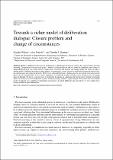Files in this item
Towards a richer model of deliberation dialogue : closure problem and change of circumstances
Item metadata
| dc.contributor.author | Walton, Douglas | |
| dc.contributor.author | Toniolo, Alice | |
| dc.contributor.author | Norman, Timothy J. | |
| dc.date.accessioned | 2017-04-03T11:30:12Z | |
| dc.date.available | 2017-04-03T11:30:12Z | |
| dc.date.issued | 2016-11-26 | |
| dc.identifier | 249556479 | |
| dc.identifier | f9ff6779-325f-498f-9751-e65482c9e530 | |
| dc.identifier | 85015195076 | |
| dc.identifier | 000390248400004 | |
| dc.identifier.citation | Walton , D , Toniolo , A & Norman , T J 2016 , ' Towards a richer model of deliberation dialogue : closure problem and change of circumstances ' , Argument and Computation , vol. 7 , no. 2-3 , pp. 155-173 . https://doi.org/10.3233/AAC-160009 | en |
| dc.identifier.issn | 1946-2166 | |
| dc.identifier.other | ORCID: /0000-0002-6816-6360/work/48774920 | |
| dc.identifier.uri | https://hdl.handle.net/10023/10575 | |
| dc.description | This research was partially supported by Social Sciences and Humanities Research Council of Canada Insight Grant 435-2012-0104. This research was also partially supported by the award made by the RCUK Digital Economy program to the dot.rural Digital Economy Hub at the University of Aberdeen; award ref. : EP/G066051/1. Further refinements of this work were supported by the SICSA PECE scheme. | en |
| dc.description.abstract | Models of deliberative dialogue are fundamental for developing autonomous systems that support human practical reasoning. The question discussed in this paper is whether existing models are able to capture the complexity and richness of natural deliberation. In real-world contexts, circumstances relevant to the decision can change rapidly. We reflect on today's leading model of deliberation dialogue and we propose an extension to capture how newly exchanged information about changing circumstances may shape the dialogue.Moreover, in natural deliberation, a dialogue may be successful even if a decision on what to do has not been made. A set of criteria is proposed to address the problem of when to close off the practical reasoning phase of dialogue. We discuss some measures for evaluating the success of a dialogue after closure and we present some initial efforts to introduce the new deliberation features within an existing model of agent dialogue. We believe that our extended model of dialogue may contribute to representing that richness of natural deliberative dialogue that is yet to be addressed in existing models of agent deliberation. | |
| dc.format.extent | 19 | |
| dc.format.extent | 294078 | |
| dc.language.iso | eng | |
| dc.relation.ispartof | Argument and Computation | en |
| dc.subject | Deliberative dialogue | en |
| dc.subject | Dialogue closure | en |
| dc.subject | Practical reasoning | en |
| dc.subject | QA75 Electronic computers. Computer science | en |
| dc.subject | Linguistics and Language | en |
| dc.subject | Computer Science Applications | en |
| dc.subject | Computational Mathematics | en |
| dc.subject | Artificial Intelligence | en |
| dc.subject | NDAS | en |
| dc.subject.lcc | QA75 | en |
| dc.title | Towards a richer model of deliberation dialogue : closure problem and change of circumstances | en |
| dc.type | Journal article | en |
| dc.contributor.institution | University of St Andrews. School of Computer Science | en |
| dc.identifier.doi | https://doi.org/10.3233/AAC-160009 | |
| dc.description.status | Peer reviewed | en |
This item appears in the following Collection(s)
Items in the St Andrews Research Repository are protected by copyright, with all rights reserved, unless otherwise indicated.

